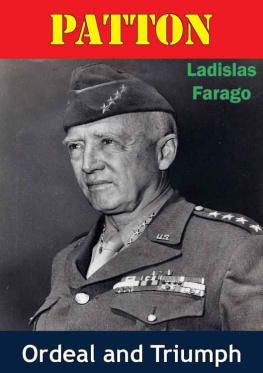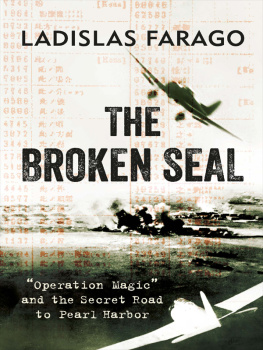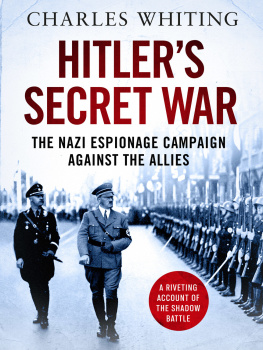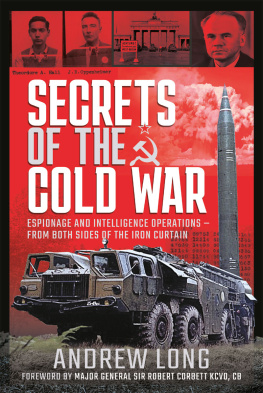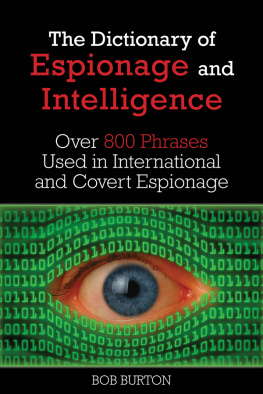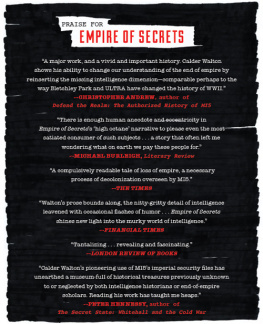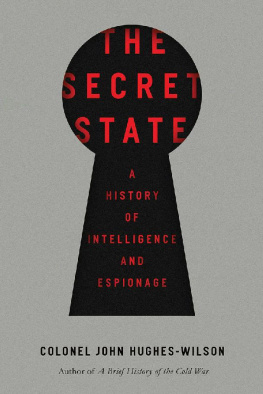BURN AFTER READING
BURN
AFTER
READING
THE ESPIONAGE HISTORY
OF WORLD WAR II
By
Ladislas Farago

BLUEJACKET BOOKS
Naval Institute Press
Annapolis, Maryland
This book has been brought to publication by the generous assistance of Marguerite and Gerry Lenfest.
Naval Institute Press
291 Wood Road
Annapolis, MD 21402
1961 by Ladislas Farago
All rights reserved. No part of this book may be reproduced or utilized in any form or by any means, electronic or mechanical, including photocopying and recording, or by any information storage and retrieval system, without permission in writing from the publisher.
First Bluejacket Books printing, 2003
Library of Congress Cataloging-in-Publication Data
Farago, Ladislas.
Burn after reading : the espionage history of World War II / by Ladislas Farago.
p. cm. (Bluejacket books)
Originally published: New York: Walker, 1961.
Includes bibliographical references and index.
ISBN 978-1-61251-180-1 (alk. paper)
1. World War, 19391945Secret service. 2. World War, 19391945Military intelligence. 3. SpiesHistory20th century. I. Title. II. Series.
D810.S7F3 2003
940.5485dc21
2003048837
TO
JOHN MICHAEL ARTHUR FARAGO
your name burning past you like a pure lamp.
G. A. Borgese, from
Dream of a Decent Death
Contents
Espionage has played a conspicuous and often memorable part in every war of history, but it was not until the Second World War that it became a kind of Fourth Estate of war. The nature and scope of this bitter conflict produced special armies that fought clandestinely behind the lines and on their own fronts. The true magnitude of this furtive contest can be seen, for example, from the casualties of Greece. Of the seventy-three thousand Greeks killed in World War II, twenty-three thousand died in conventional warfarefifty thousand were killed in various surreptitious enterprises. In Norway, where the blunt phase of the war lasted only a few days, the underground war continued for five years, waged by an army of forty-seven thousand stealthy combatants. The Yugoslavs, fighting their hugger-mugger war in the black mountains, suffered greater losses than any of the Alliesone million, seven hundred six thousand men and women killed in hit-and-run actions.
I trust it is clear that I am using the word espionage in a generic sense. While this book is the history of espionage during World War II, it also covers the whole curriculum of clandestine operations, the several forms of intelligence, espionage and sabotage, subversion and counter-espionage, the whole secret contest conducted apart from the formal and conventional operations of modern war.
Espionage was practiced by both sides, but only on the Allied side was it such a vast enterprise. This is understandable; in the occupied countries of Europe and Asia it was the only opportunity for the oppressed to defy and harm the oppressor. It was this spontaneous rebellion born in the soul of men and borne by their indomitable will to freedom that endowed the dubious business with an aura of decency and that justified its larcenies and homicides.
It was but a side show of the greater war, yet it was a war itself in all but name. The defunct Duce may not be a proper character witness on any other score, but on the essence of war he was an eloquent authority, refreshingly free of hypocrisy. Mussolini once said that war alone brings human energy up to its highest tension and puts the stamp of nobility upon the peoples who have the courage to confront it. Nowhere was the war more noble and courageous than in the resistance of millions to tyranny.
It was largely this redeeming feature of the secret phase of World War II that induced me to write this book. A student of history can play no favorites. To the historian of espionage, a German spy performing his sordid functions for his country and cause is as proper an individual for study as an American agent spying for his country and cause. Yet in World War II there was a difference, and even the most pedantically objective historian is bound to recognize the distinction. I was inspired in this by General Sir Colin McVean Gubbins, chief of Britains Special Operations Executive, who wrote: What resistance entailed through the long years of dreadful night in the occupied territories was a day-to-day battle with the Gestapo, the Quislings and the Japanese secret police, one long continuous struggle, with torture and unbelievable suffering and death waiting round every corner at every moment. Yet there were countless thousands who undertook the task, to whom all that mattered was their own eternal spiritual indestructibility. They dedicated themselves to a cause they knew to be higher than self.
Even so I have certain reservations. One who was as closely preoccupied as I was for years with such a romantic and emotionally supercharged activity inevitably develops a point of view, and I confess I did develop a certain bias. For one thing, I came to regard some of the business with a mild contempt, in the spirit of Virgil who warned that vice is nourished by secrecy. Much of the business is rather childish, a relapse of grown men into boyish antics, a nebulous pastime to which no adult who cherishes his full dignity and integrity should devote uncritical attention. For another thing, I could not wholly sanction the inherent deceit of the game. What usually began as temporary skulduggery frequently led to corruption that the ad hoc practitioners of the game carried like an ugly scar for the rest of their lives.
This is evident today in the Cold War when espionage is rampant and is, indeed, its major implement. The dismal way in which the Cold War is fought, even by great nations of traditional decency, is the direct outgrowth of this wartime experience; it is the acceptance of something designed as a temporary expedient as an enduring instrument of national power.
I did not try to eradicate completely this bias from the pages of this book. I refused to take the business of espionage too solemnly, as some writers do; they place too much emphasis on the heroics of the game and too little on its theatrics. I trust the reader will bear with me if I became not carried too far by the sheer melodrama of the subject and did not solemnize the exploits of all spies, but rather tried to view them with a sense of proportion.
In view of the huge scope of this clandestine struggle, any narrative trying to describe it must be incomplete and inadequate. I am sure this narrative is no exception. In order to give a rounded picture, I had to deal with both the topic and the events selectively. I regret that limitations of space prevented me from dealing fully with all the resistance movements and especially the guerrilla war in the Philippines. I deliberately omitted incidents already very well known, such as the mute adventure of the man who never was and the case of Tyler Kent. Several well publicized adventures, like the penetration of Scapa Flow by a U-boat allegedly guided to its target by a spy, were omitted because they never really happened. I am sure that students of the subject will find many more omissions and also, inevitably, errors. While I apologize for any errors that may occur, I can only point to the obvious difficulty of getting everything straight in a business that is so crooked.


